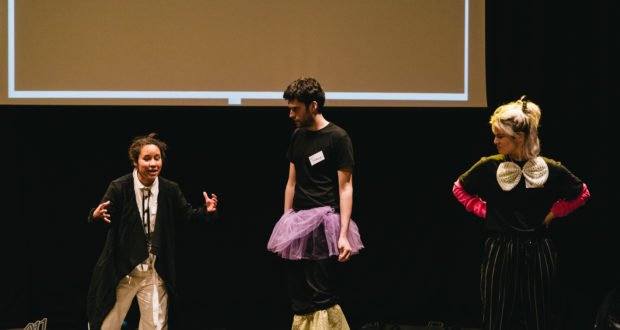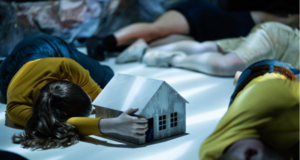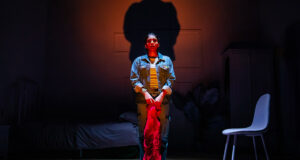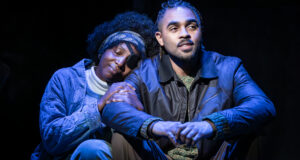Part game, part social experiment, Hidden Track's new show is an engaging journey steeped in political reflections, which delivers top notch entertainment whilst delving into crucial topics.Summary
Rating
Excellent
After a scratch night at the Camden’s People Theatre last March, the award-winning interactive theatre company Hidden Track take their new show Drawing the Line to the Deptford Lounge. Running for two hours plus interval, this is a thoroughly well devised game where audiences are repeatedly compelled to take part, make decisions and compete for the welfare of their fictional nation.
With the audience surrounding the performing space on three sides, each seat bears a black business card reading “No, thank you!” – perhaps to be used to decline an invite to join in, or maybe meant as a general reminder that it’s OK to reject what one doesn’t agree with.
On the same level as the audience, the stage is spacious and completely empty, with only the three performers, Steph Reynolds, Nisa Cole and Elliot Hughes, standing at the back.
In turns, the three talented actors begin by describing the world prior to the one we know now – when it was just an indistinct surface containing no borders, nor differences between its inhabitants. Then they draw the line, running a rope across the auditorium, splitting the audience into two groups. Each group are placed in charge of their respective section, or nation, for which they’re called on to choose a ruler, a name and a flag.
As the game develops, volunteers are called on stage to carry out tasks or undertake challenges, the purpose of which is to earn points for their nation. The nation with the most points is then entitled to move the line in their favour whilst making increasingly significant decisions that affect the other nation. We are left to ponder if these points are a metaphor for money. All of a sudden, aggressive reactions are provoked from both sides, the previous light-heartedly approach to the first skirmish changes as we realise that peace is irreparably broken.
From that point onwards, the game turns into a proper social experiment, exploring some of the dynamics that lead to the breach of essential human rights. The condition of refugee is portrayed as a necessary choice. The sense of belonging and nationalism are reinforced by the induced awareness that there are tangible differences between the inhabitants of the two nations. Two distinct communities are born, and their members fight for an identity that a few hours earlier didn’t even exist. The atmosphere is eerie and the mood is no longer playful.
In the following steps, individuals are pressured to conform to the majority and to focus on earning points without challenging the rather questionable ethics that feed the process. Supervisors are recruited to enforce rules that are no longer transparent, nor necessarily fair towards the most vulnerable pockets of society. Those who migrate from the weaker nation are in a constant condition of disadvantage and their voice is silenced by those who offer asylum in exchange for endorsement. The outcome is alarming and yet very familiar.
There are some loose ends in the second half which could be tidied up to slightly reduce the running time, as the point is made with no real need for the rhetorical speeches. The political message is effective and resounds long after the lights go up. Before the eyes of an astonished audience, a new world has evolved, carrying its own system of rules and injustice, and proving that inequality is deeply rooted within human nature.
With this engaging journey, Drawing the Line is a prime example of how theatre can assume different shapes and forms, in order to deliver top notch entertainment whilst delving into crucial topics.
Author: Elliot Hughes
Director: Anoushka Bonwick
Producer: Hidden Track
Box Office: 020 8314 7288
Booking Link: https://www.thealbany.org.uk/shows/drawing-the-line/
Booking Until: 25 May 2019
 Everything Theatre Reviews, interviews and news for theatre lovers, London and beyond
Everything Theatre Reviews, interviews and news for theatre lovers, London and beyond



